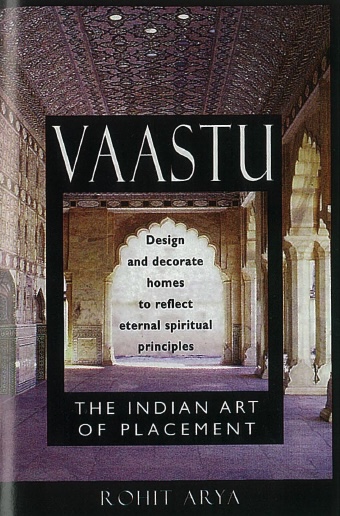By Tara Katir
Most people have heard of vaastu, the ancient Indian art of house layout and placement, or at least its popular Chinese counterpart, feng shui. But let’s face it–most people can’t afford to tear down their house and build an ideal house in perfect harmony with nature and the five elements. Even so, there are many things that can be done. Vaastu, The Indian Art of Placement, by Rohit Arya (119 pages, Destiny Books, us$12.95) tackles the complex art of vaastu in a simple, practical and easy-to-understand way. Whether you are selecting land, building a house, remodeling or moving in, this book has flexible guidelines so you can apply vaastu principles to create a personal environment that promotes peace, harmony and health. Vaastu is based on the square–the builder’s most auspicious shape–and the four directions. Tips are up-to-date with modern life and include advice on placement of computers in an office building, and dealing with overhead powerlines. Also discussed is a comparison between vaastu and feng shui. The author, Rohit Arya, is a professional journalist and art critic who lives in Mumbai, India.
Destiny Books, One Park Street, Rochester, Vermont 05767 USA. web: www.innertraditions.com.
AMMACHI’S VIDEO
When asked by a devotee how she can tirelessly give darshan for up to 17 hours for hundreds of people, Mata Amritanandamayi Devi declared, “Where there is love, there is no effort.” The extraordinary life of this modern-day saint has been lovingly chronicled in River of Love, A Documentary Drama on the Life of Ammachi (78 minutes, Mystic Fire Video, us$29.98). Producer Sridhar Steven Silberfein and Michael Tobias, who is an award-winning producer and director, have made a beautiful and sensitive docudrama of this saintly woman. Ammachi’s early life was depicted by ashram residents who felt this a unique and blessed opportunity. “We had no script, no professional actors–all our locations were in and around the ashram–and we shot the whole movie in 11 days,” recalled Silberfein. Ammachi’s life unfolds through her early life in the sleepy Kerala fishing village, interspersed with interviews from her mother and father. Her parents and siblings declared that Ammachi, then known as Sudhamani, was not your usual child. Absorbed in God consciousness from an early age, Sudhamani’s behavior was considered nonconformist and outrageous by her family and the villagers. Staying up all night singing to Krishna and dancing in ecstasy on the beach, only to fall asleep at daybreak under a palm tree did not make her parents happy at the time. But Sudhamani was undeterred regardless of the punishments meted out. Her family noticed the unusual relationship she has with animals, as they seem to understand Sudhamani’s God intoxication more than other people. In a striking interview given by her grandmother, she relates how one day, while plucking flowers, she encountered a cobra and yelled for help. Sudhamani came running and spoke to the snake, telling him this was her grandmother and not to harm her. Touching testimonials from Ammachi’s sannyasins and devotees paint a loving picture of Amma’s life-changing darshan. Her 30 years of service has produced a beautiful ashram in Amritapuri, 17 charitable projects which include schools, housing for the poor and an 800-bed, high-tech hospital where medical care is free. Unconditional love pours from Ammachi during her interviews in the film as she declares, “The difficulty is not to express love…love is the nature of human beings.” This is a must-see, heart-melting video for all ages.
River of Love, a Documentary Drama on the Life of Ammachi, Mystic Fire Video, PO. Box 422, New York, New York 10012, PH 212.941.1443
www.mysticfire.com.
NOTABLE BOOKS
Here are two small yet potent books: Seventy Sacred Stanzas from Tirumular’s Tirumantira Malai by Dr. Sangaratna S. M. Ponniah (75 pages, Sanathana Dharma Publications, us$10.00) is a collection of 70 verses in both Tamil and English from the Tirumantiram, an ancient treasure of mystical writing. The Book of Compassion, compiled by Pramoda Chitrabhanu and Pravin K. Shah (60 pages, Jain Study Center of North Carolina, us$1.00 or free on web), is a compelling collection of articles about nonviolence and animals made especially for the Jain community.
sanathana dharma publications, 15 Lintang Besi, off Jalan Melawis, 41000 Klang, Selangor, Malaysia. PH: 603.5518.5014
email: chudika@tm.net.my.
Jain Study Center of North Carolina 509 Carriage Wood Circle, Raleigh, North Carolina 27607 USA. web: www.jainism.org. email: jscnc@attglobal.net.
